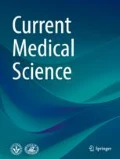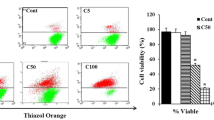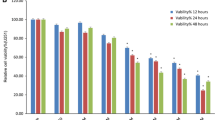Summary
Fucoidan is an active component of seaweed, which inhibits proliferation and induces apoptosis of several tumor cells while the detailed mechanisms underlying this process are still not clear. In this study, the effect of Fucoidan on the proliferation and apoptosis of human breast cancer MCF-7 cells and the molecular mechanism of Fucoidan action were investigated. Viable cell number of MCF-7 cells was decreased by Fucoidan treatment in a dose-dependent manner as measured by MTT assay. Fucoidan treatment resulted in G1 phase arrest of MCF-7 cells as revealed by flow cytometry, which was associated with the decrease in the gene expression of cyclin D1 and CDK-4. Annexin V/PI staining results showed that the number of apoptotic cells was associated with regulation of cytochrome C, caspase-8, Bax and Bcl-2 at transcriptional and translational levels. Both morphologic observation and Hoechst 33258 assay results confirmed the pro-apoptotic effect of Fucoidan. Meanwhile, the ROS production was also increased by Fucoidan treatment, which suggested that Fucoidan induced oxidative damage in MCF-7 cells. The results of present study demonstrated that Fucoidan could induce G1 phase arrest and apoptosis in MCF-7 cells through regulating the cell cycle and apoptosis-related genes or proteins expression, and ROS generation is also involved in these processes.
Similar content being viewed by others
References
Agarwal G, Ramakant P, Forgach ER, et al. Breast cancer care in developing countries. World J Surg, 2009,33(10):2069–2076
Kang KS, Yun JW, Lee YS. Protective effect of L-carnosine against 12-O-tetradecanoylphorbol-13-acetate- or hydrogen peroxide-induced apoptosis on v-myc transformed rat liver epithelial cells. Cancer Lett, 2002,178(1):53–62
Kang KS, Yun JW, Yoon B, et al. Preventive effect of germanium dioxide on the inhibition of gap junctional intercellular communication by TPA. Cancer Lett, 2001,166(2):147–153
Lee KW, Lee HJ, Kang KS, et al. Preventive effects of vitamin C on carcinogenesis. Lancet, 2002,359(9301): 172
Kang KS, Kang BC, Lee BJ, et al. Preventive effect of epicatechin and ginsenoside Rb(2) on the inhibition of gap junctional intercellular communication by TPA and H(2)O(2). Cancer Lett, 2000,152(1):97–106
Kwon MJ, Nam TJ. Porphyran induces apoptosis related signal pathway in AGS gastric cancer cell lines. Life Sci, 2006,79(20):1956–1962
Yoshida T, Sasahara Y, Miyakawa S, et al. Reduced T cell response to β-lactoglobulin by conjugation with acidic oligosaccharides. J Agric Food Chem, 2005,53(17):6851–6857
Davis TA, Volesky B. A review of the biochemistry of heavy metal biosorption by brown algae. Water Res, 2003,37(18):4311–4330
Zapopozhets T, Besednova N, Loenko IN. Antibacterial and immunomodulating activity of fucoidan. Antibiot Khimioter, 1995,40(2):9–13
Hayashi K, Nakano T, Hashimoto M, et al. Defensive effects of a fucoidan from brown alga Undaria pinnatifida against herpes simplex virus infection. Int Immunopharmacol, 2008,8(1):109–116
Makarenkova ID, Kompantets GG, Besednova NN, et al. Inhibiting effects of fucoidans on Hantaan virus adsorption on a model of peritoneal macrophages in vitro. Voprosy Virusologii, 2008,53(3):12
Wang J, Zhang Q, Zhang Z, et al. Antioxidant activity of sulfated polysaccharide fractions extracted from Laminaria japonica. Int J Biol Macromol, 2008,42(2):127–132
Matsumoto S, Nagaoka M, Hara T, et al. Fucoidan derived from Cladosiphon okamuranus Tokida ameliorates murine chronic colitis through the down-regulation of interleukin-6 production on colonic epithelial cells. Clin Exp Immunol, 2004,136(3):432–439
Aisa Y, Miyakawa Y, Nakazato T, et al. Fucoidan induces apoptosis of human HS-Sultan cells accompanied by activation of caspase-3 and down-regulation of ERK pathways. Am J Hematol, 2005,78(1):7–14
Philchenkov A, Zavelevich M, Imbs T, et al. Sensitization of human malignant lymphoid cells to etoposide by fucoidan, a brown seaweed polysaccharide. Exp Oncol, 2007,29(3):181–185
Desagher S, Osen-Sand A, Nichols A, et al. Bid-induced conformational change of Bax is responsible for mitochondrial cytochrome c release during apoptosis. J Cell Biol, 1999,144(5):891–901
Eskes R, Desagher S, Antonsson B, et al. Bid induces the oligomerization and insertion of Bax into the outer mitochondrial membrane. Mol Cell Biol, 2000,20(3):929–935
Li H, Zhu H, Xu C, et al. Cleavage of BID by caspase 8 mediates the mitochondrial damage in the Fas pathway of apoptosis. Cell, 1998,94(4):491–502
Furuta E, Pai SK, Zhan R, et al. Fatty acid synthase gene is up-regulated by hypoxia via activation of Akt and sterol regulatory element binding protein-1. Cancer Res, 2008,68(4):1003–1011
Liu H, Liu Y, Zhang JT. A new mechanism of drug resistance in breast cancer cells: fatty acid synthase overexpression-mediated palmitate overproduction. Mol Cancer Therap, 2008,7(2):263–270
Riedl SJ, Salvesen GS. The apoptosome: signalling platform of cell death. Nat Rev Mol Cell Biol, 2007,8(5):405–413
Vazquez-Martin A, Colomer R, Brunet J, et al. Overexpression of fatty acid synthase gene activates HER1/HER2 tyrosine kinase receptors in human breast epithelial cells. Cell Prolif, 2008,41(1):59–85
Kroemer G, Reed JC. Mitochondrial control of cell death. Nat Med, 2000,6(5):513
Zhang Z, Teruya K, Eto H, et al. Fucoidan extract induces apoptosis in MCF-7 cells via a mechanism involving the ROS-dependent JNK activation and mitochondria-mediated pathways. PloS One, 2011,6(11):e27441
Ashkenazi A, Dixit VM. Death receptors: signaling and modulation. Science, 1998,281(5381):1305–1308
Wallach D, Varfolomeev EE, Malinin NL, et al. Tumor necrosis factor receptor and Fas signaling mechanisms. Annu Rev Immunol, 1999,17(1):331–367
Green DR, Reed JC. Mitochondria and apoptosis. Science, 1998,281(5381):1309–1312
Antonsson B, Conti F, Ciavatta AM, et al. Inhibition of Bax channel-forming activity by Bcl-2. Science, 1997,277(5324):370–372
Huang P, Feng L, Oldham EA, et al. Superoxide dismutase as a target for the selective killing of cancer cells. Nature, 2000,407(6802):390–395
Pelicano H, Feng L, Zhou Y, et al. Inhibition of mitochondrial respiration: a novel strategy to enhance drug-induced apoptosis in human leukemia cells by a reactive oxygen species-mediated mechanism. Journal of Biological Chemistry, 2003,278(39):37 832–37 839
Zamzami N, Marchetti P, Castedo M, et al. Sequential reduction of mitochondrial transmembrane potential and generation of reactive oxygen species in early programmed cell death. J Exp Med, 1995,182(2):367–377
Itoh H, Noda H, Amano H, et al. Antitumor activity and immunological properties of marine algal polysaccharides, especially fucoidan, prepared from Sargassum thunbergii of Phaeophyceae. Anticancer Res, 1993,13(6A):2045
Riou D, Colliec-Jouault S, Pinczon du Sel D, et al. Antitumor and antiproliferative effects of a fucan extracted from ascophyllum nodosum against a non-small-cell bronchopulmonary carcinoma line. Anticancer Res, 1996,16(3A):1213
Haneji K, Matsuda T, Tomita M, et al. Fucoidan extracted from Cladosiphon okamuranus Tokida induces apoptosis of human T-cell leukemia virus type 1-infected T-cell lines and primary adult T-cell leukemia cells. Nutr Cancer, 2005,52(2):189–201
Hyun JH, Kim SC, Kang JI, et al. Apoptosis inducing activity of fucoidan in HCT-15 colon carcinoma cells. Biol Pharm Bull, 2009,32(10):1760–1764
Kim E, Park S, Lee JY, et al. Fucoidan present in brown algae induces apoptosis of human colon cancer cells. BMC Gastroenterol, 2010,10(1):96
Koyanagi S, Tanigawa N, Nakagawa H, et al. Oversulfation of fucoidan enhances its anti-angiogenic and antitumor activities. Biochem Pharmacol, 2003,65(2):173–179
Nagamine T, Hayakawa K, Kusakabe T, et al. Inhibitory effect of fucoidan on Huh7 hepatoma cells through downregulation of CXCL12. Nutr Cancer, 2009,61(3):340–347
Ye J, Li Y, Teruya K, et al. Enzyme-digested Fucoidan extracts derived from seaweed Mozuku of Cladosiphon novae-caledoniaekylin inhibit invasion and angiogenesis of tumor cells. Cytotechnology, 2005,47(1):117–126
Yamasaki-Miyamoto Y, Yamasaki M, Tachibana H, et al. Fucoidan induces apoptosis through activation of caspase-8 on human breast cancer MCF-7 cells. J Agric Food Chem, 2009,57(18):8677–8682
Suen DF, Norris KL, Youle RJ. Mitochondrial dynamics and apoptosis. Genes Dev, 2008,22(12):1577–1590
Kroemer G, Martin SJ. Caspase-independent cell death. Nat Med, 2005,11(7):725–730
Wang X. The expanding role of mitochondria in apoptosis. Genes Dev, 2001,15(22):2922–2933
Breckenridge DG, Xue D. Regulation of mitochondrial membrane permeabilization by BCL-2 family proteins and caspases. Cur Opin Cell Biol, 2004,16(6):647–652
Raisova M, Hossini AM, Eberle J, et al. The Bax/Bcl-2 ratio determines the susceptibility of human melanoma cells to CD95/Fas-mediated apoptosis. J Invest Dermatol, 2001,117(2):333–340
Bernardi P, Vassanelli S, Veronese P, et al. Modulation of the mitochondrial permeability transition pore. Effect of protons and divalent cations. J Biol Chem, 1992,267(5):2934–2939
Author information
Authors and Affiliations
Corresponding authors
Additional information
This project was supported by grants from The National Maritime Bureau Public Science and Technology Research Funds Projects of Ocean (No. 201005013) and the Wuhan Municipal Science and Technology Research Project of China (No. 201260523185).
Rights and permissions
About this article
Cite this article
Banafa, A.M., Roshan, S., Liu, Yy. et al. Fucoidan induces G1 phase arrest and apoptosis through caspases-dependent pathway and ROS induction in human breast cancer MCF-7 cells. J. Huazhong Univ. Sci. Technol. [Med. Sci.] 33, 717–724 (2013). https://doi.org/10.1007/s11596-013-1186-8
Received:
Revised:
Published:
Issue Date:
DOI: https://doi.org/10.1007/s11596-013-1186-8




